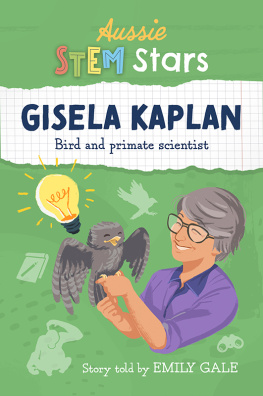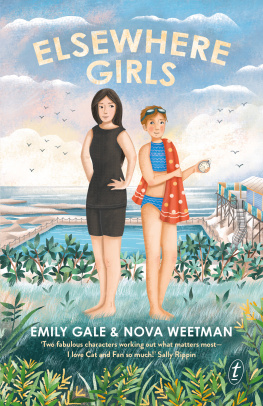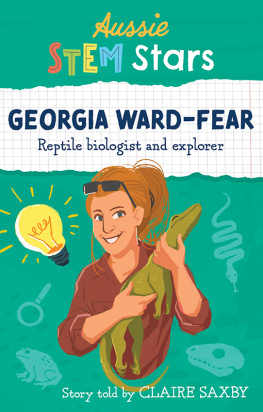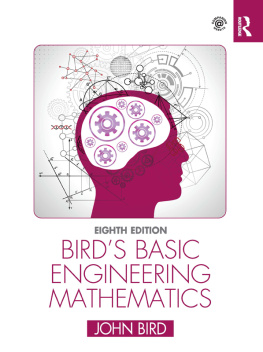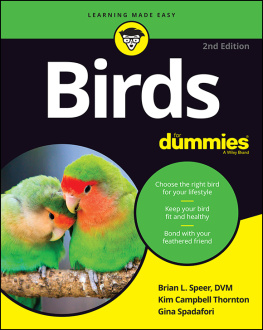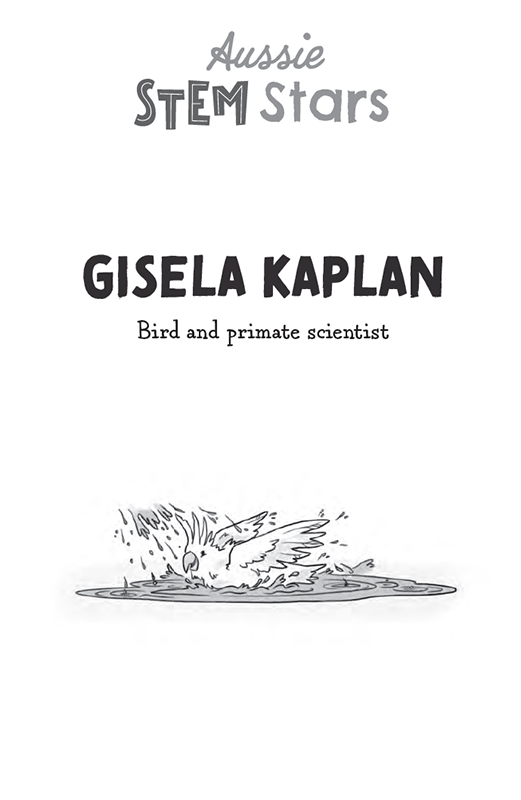
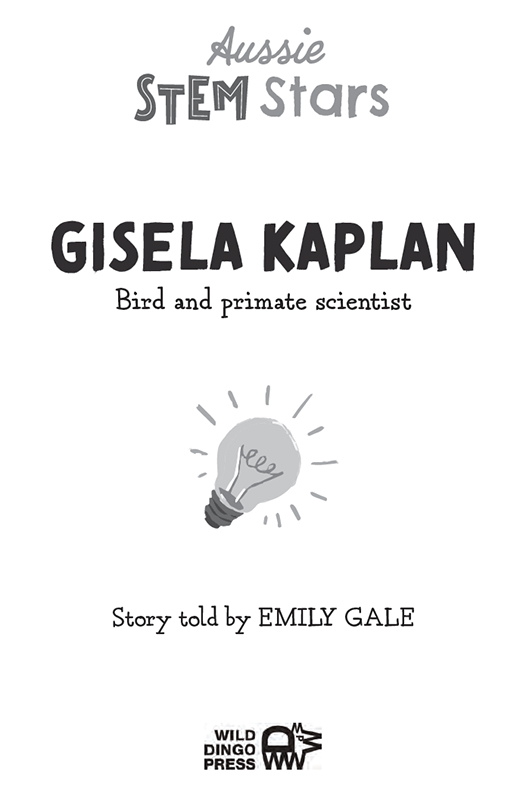
Aussie STEM Stars series
Published by Wild Dingo Press
Melbourne, Australia
wilddingopress.com.au
This work was first published by Wild Dingo Press 2021
Text copyright Emily Gale
The moral right of the author has been asserted.
Reproduction and communication for educational purposes:
The Australian Copyright Act 1968 (the Act) allows a maximum of one chapter or 10% of the pages of this work, whichever is the greater, to be reproduced and/or communicated by an educational institution for its educational purposes provided that the educational institution (or the body that administers it) has given a remuneration to Copyright Agency under the Act.
For details of the Copyright Agency licence for educational institutions contact:
Copyright Agency
Level 11, 66 Goulburn Street
Sydney NSW 2000
Email:
Reproduction and communication for other purposes:
Except as permitted under the Copyright Act 1968, no part of this book may be reproduced, stored in a retrieval system, or transmitted in any form or by any means without prior written permission.
All inquiries should be made to the Publisher, Wild Dingo Press.
Cover Design: Gisela Beer
Illustrations: Diana Silkina
Series Editor: Catherine Lewis
Printed in Australia
Gale, Emily 1975-, author.
Gisela Kaplan: Bird and primate scientist / Emily Gale

ISBN: 9781925893465 (paperback)
ISBN: 9781925893472 (epdf)
ISBN: 9781925893489 (epub)
Every living thing on this planet has a right to be, has intrinsic value and deserves empathy and due regard for its needs.
Gisela Kaplan
Disclaimer
This work has been developed in collaboration with Professor Gisela Kaplan. The utmost care has been taken to respectfully portray, as accurately as memory allows, the events and the stories of all who appear in this work. The publishers assume no liability or responsibility for unintended inaccuracies but would be pleased to rectify at the earliest opportunity any omissions or errors brought to their notice.
Contents

Waiting for Nan
Inside a small unit in Berlin, everything was quiet and still. Almost everything. That morning Gisela was like a city sparrow: alert and restless. It was Nans day. The best day. She felt lighter than she had all week at school, as if her bones were hollow on Sundays.
Gisela climbed from the wooden cot without a sound because it was important not to wake her parents. The cot had been her bed for seven years, but it was that or the floor and she knew better than to complain. Her mothers temper was unpredictable. Though small for her age, by now Giselas legs hung out between the bars so it was a relief to get up and stretch. She stood by the window watching a clear dawn. It was spring, she could tell by the blackbirds song, which meant no shivering as she got dressed and no ice crystals on the inside of the glass. Berlin winters were cruel when you were poor.
A door slammed in the next-door unit and startled her. She pressed her ear to the wall of the room where her parents slept. Luckily, nothing stirred. Her father worked long hours in the day and studied at night. He was one of the lucky ones to have secured an apprenticeship after the war, but they were living on the edge with his meagre pay.
*
The worst war in history had ended six years ago and the scars were deep. There were scars Gisela could see every day, like rubble in the streets, or a church with a bombed spire; a neighbour whose leg finished at his knee, or a stranger collapsed in the street from hunger. And there were scars she couldnt see but sensed in the people she lived among. A terrible sadness that wouldnt go away. Gisela already knew that people could be broken on the inside.
Her clothes were handmade by her mother, using any scrap of material she could find. Her stripy jumper was only patterned that way because it had been knitted using hundreds of different lengths of wool. This was one of the reasons why school was miserable. There was no uniform and almost every other girl was from a wealthy family, so Giselas clothes drew the wrong kind of attention.
She was small and wiry with dark hair while her schoolmates were mostly blonde with the bluest eyes. The Nazis under Hitlers rule had wanted a whole race of blonde and blue-eyed people to populate Germany. Millions of people who didnt fit their description of an ideal human had been sent to concentration camps*. There they had been starved, beaten, used for medical experiments and sent to the gas chambers.
Germany wasnt ruled by Nazis anymore but Gisela was still treated by some as a misfit. Just the sight of her turned girls at school sour. They thought she didnt belong. Gisela didnt really understand why she was there either, only that her father had pleaded with the authorities to give her a place. The school had a reputation for expecting hard work and the highest results. To her father it was some compensation for what families like theirs had lost when the Nazis were in power.
Giselas grandfather came from Eastern Europe and, with that background, such families were declared stateless under Hitler even though Giselas parents were born in Berlin.
She crept to the kitchen where there was a gas stove, a small sink, a single chair and barely room for two people to stand. All shed eaten yesterday was a hunk of rye bread dipped in watery barley soup. Every day she hoped for at least as much as shed eaten the day before. Any less and Gisela thought shed end up like the bodies in the street that didnt move. If people werent dying of starvation, they were dying of pneumonia or typhoid fever. Gisela had seen people stumbling in the street and going down with a thump. She was warned to stay away from them because they could be infectious.
After the war, from 1945 to 1949, millions of people in Germany died from hunger.
She found a small piece of bread which she ate hastily, leaving enough for her parents. Half a loaf had to last the three of them a week. Mostly their food came from a can or was made of powder powdered milk, powdered soup, powdered egg. Their only vegetables were potatoes, cabbage and onions. Gisela had never tasted meat. Sometimes she was so hungry that she ate nettles.
She checked the time. Nan had promised to come as early as possible but it was a long way by train. Getting up at dawn had been optimistic, even when it came to magical Nan.
During the food shortages in West Berlin after the war, the Allies sent in large quantities of powdered food because it was easier to transport and distribute.
Giselas grandmother was so special that when she walked into a room, people seemed to fall under her spell. Theyd stop what they were doing. Not because Nan was tall or grand or loud; she was none of those things. It was hard to explain but Nan had a kind of light inside her.
After shed tidied up any evidence that shed been in the kitchen, she returned to the other room. A good use of her time would be to practise her words like Nan had suggested. Giselas stutter meant that her words didnt always come out as she planned. Words would get stuck at the beginning or halfway through. And the harder she tried to force the word out of her mouth, the more frustrating it was. Just one more thing that made her an outcast at school, besides her homemade clothes and where she lived. The girls teased her every time she spoke, which made her stutter even more.
Next page
